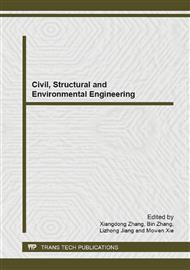[1]
Transparency International: Bribe payers index http: /transparency. org [accessed May 20`13].
Google Scholar
[2]
B. G. Kang: Principles and practices of construction ethics management: With a Comparative Study between the UK and Korea. VDM (2009).
Google Scholar
[3]
B. J. Jackson: The Perceptions of Experienced Construction Practitioners Regarding Ethical Transgressions in the Construction Industry. Construction Education and Research Vol. 1 (2005), pp.112-128.
Google Scholar
[4]
H. A. Rahman, C. Wang, and X. W. Yap: How Professional Ethics Impact Construction Quality: Perception and Evidence in a Fast Developing Economy, Scientific Research and Essays Vol. 5-23 (2010), pp.3742-3749.
Google Scholar
[5]
D. Tow, and M. Loosemore: Corporate Ethics in the Construction and Engineering Industry, Journal of Legal Affairs and Dispute Resolution in engineering and Construction, Vol. 1-3 (2009), pp.122-129.
DOI: 10.1061/(asce)la.1943-4170.0000012
Google Scholar
[6]
L. C. N. Fan, and P. W. Fox:. Exploring Factors for Ethical Decision Making: Views from Construction Professionals. Professional Issues in Engineering education and practice 135-2 (2009), pp.60-69.
DOI: 10.1061/(asce)1052-3928(2009)135:2(60)
Google Scholar
[7]
J. Poon: The study of ethical perceptions of construction managers, ARCOM Proceedings of 20th Annual Conference (2004), pp.973-983.
Google Scholar
[8]
A. Zarkada-Fraser and M. Skitmore: Decision with moral content: Collusion, Construction Management and Economics, Vol. 18- 1 (2000), pp.101-111.
DOI: 10.1080/014461900370997
Google Scholar
[9]
D. Jary and J. Jary: Collins dictionary of sociology, HarperCollins, London (2000).
Google Scholar
[10]
E. Cavusgil: Merck and Vioxx: An examination of an ethical decision making model, Journal of Business Ethics, Vol. 76 (2007), pp.451-461.
DOI: 10.1007/s10551-006-9302-3
Google Scholar
[11]
R. McDevitt, C. Giapponi, and C. Tromley, C. A model of ethical decision making: the integration of process and content, Journal of Business Ethics, Vol. 73-2 (2007), pp.219-229.
DOI: 10.1007/s10551-006-9202-6
Google Scholar
[12]
R. Coughlan: Codes, values and justifications in the ethical decision making process, Journal of Business Ethics, Vol. 59 (2005), pp.45-53.
DOI: 10.1007/s10551-005-3409-9
Google Scholar
[13]
M. Miner and A. Petocz: Moral theory in ethical decision making: problems, clarifications and recommendations from a psychological perspective, Journal of Business Ethics, Vol. 42 (2003), pp.11-25.
Google Scholar
[14]
A. Carroll and A. Buchholtz: Business and society: ethics and stakeholder management, 6th ed., Thomson South-Western, USA (2008).
Google Scholar
[15]
O. Ferrell, J. Fraedrich, and L. Ferrell: Business Ethics - Ethical Decision Making and Cases. Mason: South-Western Cengage Learning (2009).
Google Scholar
[16]
A. Gaudine and L. Thorne: Emotion and ethical decision making in organizations, Journal of Business Ethics, Vol. 31 (2001), pp.175-187.
Google Scholar
[17]
L. Chau and W. Siu: Ethical decision making in corporate entrepreneurial organizations, Journal of Business Ethics, Vol. 23 (2000), pp.365-375.
Google Scholar
[18]
A. M. M. Liu, R. Fellows and J. Ng: Surveyor's perspectives on ethics in organizational culture, Engineering, Construction and Architectural Management, Vol. 11-6, (2004), pp.438-449.
DOI: 10.1108/09699980410570193
Google Scholar
[19]
C. Mitcham and R. Duvall: Engineering ethics; Engineer's toolkit, Prentice –Hall (2000).
Google Scholar
[20]
J. Logsdon, and K. Yuthas: Corporate social performance, stakeholder orientation, and organizational moral development, Journal of Business Ethics, Vol. 16 (1997), pp.1213-1226.
DOI: 10.1007/978-94-009-1475-9_2
Google Scholar
[21]
L. Stainer: Ethical dimensions of management decision making, Strategic Change, Vol. 13 (2004), pp.333-342.
DOI: 10.1002/jsc.688
Google Scholar
[22]
M. J. Sirgy: Measuring corporate performance by building on the stakeholders model of business ethics, Journal of Business Ethics, Vol. 35(2002), pp.143-162.
Google Scholar
[23]
Z. Swaidan and L. Hayes: Hofstede theory and cross cultural ethics conceptualization, review and research agenda, Journal of American Academy of Business, Vol. 6(2) (2005).
Google Scholar
[24]
G. Weaver: Ethics programmes in global business: Culture's role in managing ethics, Journal of Business Ethics, Vol. 30 (2001), pp.3-15.
Google Scholar
[25]
M. Christie, I, Kwon, P. Stoeberl, and R. Baumhart: A cross-cultural comparison of ethical attitudes of business managers, Journal of Business Ethics, Vol. 46(2003), pp.263-287.
DOI: 10.1023/a:1025501426590
Google Scholar
[26]
J. W. Westerman, R. I. Beekun, Y. Stedham and J. Yamamura, J.: Peer versus national culture: An analysis of antecedents to ethical decision making, Journal of Business Ethics, Vol. 75-3 (2007), pp.239-252.
DOI: 10.1007/s10551-006-9250-y
Google Scholar


